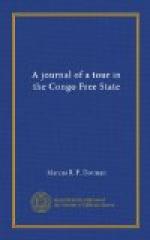Clothes of cloth are not necessary. Drill, khaki and flannel are sufficient with light helmets and plenty of strong boots. It must be remembered that everything has to be carried by porters. Clothes, blankets, etc. should be packed in tin boxes with rubber edges so that when shut they are airtight; tents pack in bales and every article of furniture should fold up. The whole equipment must be arranged so that each load is about 50 or 60 lbs and is conveniently shaped for carrying on the head or shoulder. We were careful to choose the lightest articles, whenever consistent with strength, and thus our baggage when completed weighed only a little more than two tons.
All was ready when we left Waterloo at 10.25 a.m. on Friday June 24th 1904 accompanied by Sir Alfred Jones and Sir Ralph Moor who saw us off at Southampton. The latter has had much experience of Africa and told some blood-curdling stories of the manners of the natives. Adulterers used to be punished in a most barbarous way. A youth who had erred with one of the numerous wives of a Chief, was nailed by the ears to a tree in the forest and left to starve. Women also were treated with equal severity and all manner of mutilations were practised. Such atrocities have of course been suppressed by the Congo Free State.
Having reached Southampton, we went on board the S.S. Leopoldville, a ship of about 5,000 tons burden, very clean and well-found. She belongs to the Compagnie maritime belge which runs a ship every third week from Antwerp and Southampton to Boma and Matadi. We sailed about 2 p.m. and a savoury smell from the galley reminded us that it was about seven hours since we had breakfasted.
Some of the passengers were English military officers and miners bound for the Gold Coast, but most were evidently officials of the Congo Free State. The conversation soon turned upon the agitation in Europe against the Congo Government, and it was extraordinary with what sorrowful indignation the various charges were refuted. This impressed me greatly at the time for it was in marked contrast with the indifference shown by an average Englishmen when his country and methods are abused by foreigners. Probably the explanation is, that we are so used to unmerited abuse, that we regard it as part of the normal order of things. The Congo State on the other hand, has only recently become sufficiently prosperous to attract attention.
One of the passengers dressed as a Catholic Priest, proved a veritable mine of information. This was Mgr. Derikx, Prefet Apostolique of Uele in the Upper Congo. He had had five years’ experience of the country and was well versed in all its institutions and ways. Another was a young military officer, M. Arnold, already of the rank of Commandant, for he had shown distinguished service in the field—or rather the forest—and also as an administrator at a State Post. There were also many other officials, soldiers, lawyers and commercial agents on board.




